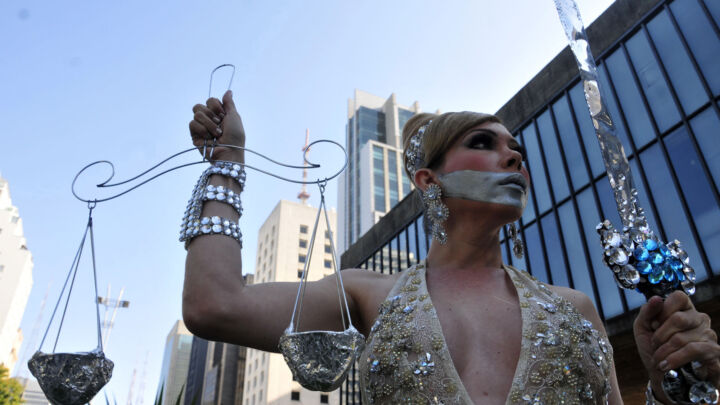Ending FGM: the White Woman’s Burden?
An Eritrean woman explains why Western campaigns to End FGM do more harm than good.

Want unlimited, ad-free access? Become a spiked supporter.
As a woman from Eritrea, now living in the UK, I find myself deeply troubled by the current obsession with the supposed problem of female genital mutilation (FGM) among African communities in Britain.
The campaign against FGM, led by feminists and various media outlets, is taking a very simplistic approach to what is a very complex cultural problem, and it risks generating yet more prejudice against, and stereotyping of, certain immigrant communities.
For women of my background, FGM is a deeply personal and private issue in which a greater understanding of the wider cultural background to this practice is essential if we are going to have a serious discussion about bringing it to an end. The problem with ‘End FGM’ campaigning is that it lacks the capacity fully to engage communities and to challenge in any meaningful way the problem of FGM; instead, it indulges in finger-pointing and scaremongering about the practices of these communities. It fails to acknowledge the various efforts being made to halt FGM within many communities, and it calls into question people’s capacity to change without the guidance – and laws – of outsiders.
So the current efforts to encourage the UK education secretary Michael Gove to make sure British schools teach about the risks of FGM is at best a waste of schools’ time and at worst is a condescending and patronising initiative that echoes the ‘let’s save these savages from themselves’ attitude that informed the Victorians who colonised our nations in Africa a hundred-plus years ago.
Most schools already have safeguarding policies in place that would allow them to take action if they heard or discovered that a pupil was at risk of FGM. Asking them to go further and actively to spy on their pupils, to go out of their way to discover hints or clues about the occurrence of FGM, will effectively turn schools into watchtowers of immigrant communities and their behaviour. Schools already have a hard time engaging with parents from such communities, because of language barriers and other social issues; putting all such parents under suspicion will only make them feel more alienated and isolated and probably make them less likely to engage with social institutions.
Change in communities doesn’t happen because some Guardian readers signed a petition on their Macs expressing their opposition to something like FGM. Such campaigning is really about easing the consciences of Westerners, through allowing them to take a stand against something they view as backward and barbaric, rather than being a real attempt to understand or deal with the problem of FGM.
This campaigning does nothing for African communities in the UK. The problem of FGM is far more complex than these petition signers and media activists appreciate. If you asked African-born women in Britain, including those who themselves have experienced FGM, whether they would allow their daughters to go through the same thing, some would say yes. Why? It isn’t because they don’t love their daughters or because they are dumb, but rather because ignoring tradition brings a high social cost for some communities. Demanding an instant, law-enforced end to FGM does nothing to change the hearts and minds of communities. In fact, vilifying and punishing immigrant parents who already live on the margins of society only pushes them further away from mainstream society, making them cling to their own cultures and traditions more tightly.
Communities can change, over time, through their own volition and through having serious discussions. Indeed, such communities are currently doing a lot of work in countries in Africa and other places where FGM is practised. In my own country, Eritrea, FGM has been banned since 2007, and great efforts have been made to shift attitudes and bring lasting change. These efforts have been led by women’s associations and the Ministry of Health and have involved much engagement with traditional cutters and midwives. My personal experience is that while most girls my age and older went through the experience of FGM, most of the younger generation of girls, especially those born after independence in 1991, have not had the same misfortune. Sadly, FGM still occurs in Eritrea, particularly in rural communities where access to education and good healthcare is virtually non-existent. But I am not aware of members of the Eritrean community here in Britain travelling back home for the ‘cutting season’, as recent news reports have suggested. In fact, as far as I know, there is no actual ‘cutting season’ in Eritrea – FGM happens at different times, and at different ages.
Traditions passed down between generations can embed themselves in people’s psyche. Changing these traditions requires real discussion and a real change of heart within a community. Many of us African women have come a long way in our understanding of how harmful FGM is. Eradicating the practice entirely will require more African women thinking about this issue, discussing it, and transforming themselves and their communities. Liberal do-gooders wagging their fingers at us will achieve nothing, except to make certain communities feel even more cut off, and thus more inclined to embrace their own ways and traditions.
Tsedal Tesfamariam is a writer based in London.
You’ve hit your monthly free article limit.
Support spiked and get unlimited access.
Support spiked and get unlimited access
spiked is funded by readers like you. Only 0.1% of regular readers currently support us. If just 1% did, we could grow our team and step up the fight for free speech and democracy.
Become a spiked supporter and enjoy unlimited, ad-free access, bonus content and exclusive events – while helping to keep independent journalism alive.
Monthly support makes the biggest difference. Thank you.








Comments
Want to join the conversation?
Only spiked supporters and patrons, who donate regularly to us, can comment on our articles.